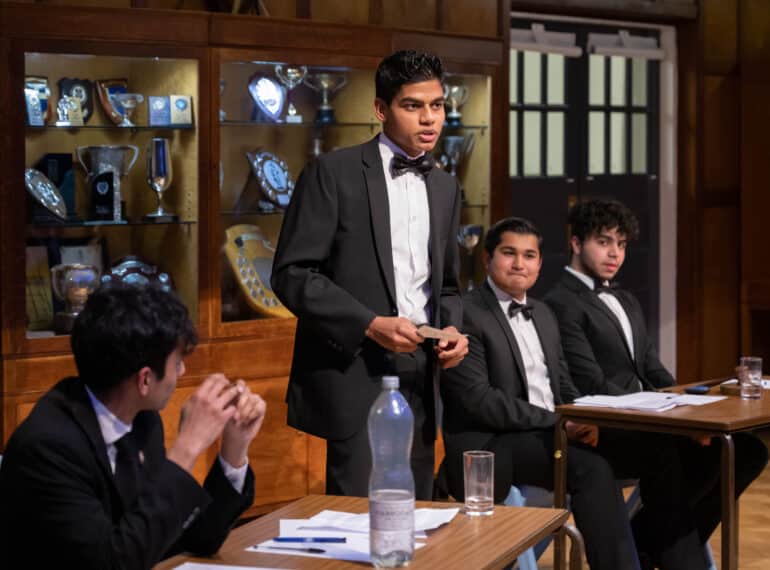
With the QE 450th anniversary celebrations at the forefront of everyone’s mind, the subject chosen for this year’s Dinner Debate was especially apt.
 Sixth-formers gathered to take on the visiting Old Elizabethans, debating the motion, This House would leave the past behind us.
Sixth-formers gathered to take on the visiting Old Elizabethans, debating the motion, This House would leave the past behind us.
In his address, Saifullah Shah (OE 2013–2020) alluded to the anniversary year, which has as its slogan, Thriving from ancient roots.
And there were reminders of the 450th anniversary celebrations even during the meal: dessert was served accompanied by white chocolate discs bearing the anniversary logo.
Headmaster Neil Enright said: “The Dinner Debate was a successful evening, continuing the happy and energetic mood from our thanksgiving service in Westminster Abbey and with a motion that caused us to think about the nature and importance of the past, while looking to the future. It certainly provoked some lively discussion, taking the debate down a number of interesting avenues.”
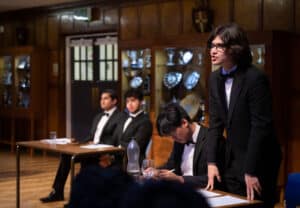 “The dinner participants also made a little bit of history themselves: our 2022 School, Captain Theo Mama-Kahn, led the loyal toast to ‘The King’, rather than ‘The Queen’, for the first time in the Dinner Debate’s history.”
“The dinner participants also made a little bit of history themselves: our 2022 School, Captain Theo Mama-Kahn, led the loyal toast to ‘The King’, rather than ‘The Queen’, for the first time in the Dinner Debate’s history.”
The event, which this year was chaired by Jai Patel, of Year 13, helps prepare the boys for some of the social occasions they may encounter early in their time at university. The debate follows the Oxford/Cambridge Union style.
With its distinctive atmosphere, it also serves as somewhat of a staging post between the boys’ present as pupils and their future as Old Elizabethans.
“The Dinner Debate is important in promoting oracy and free-thinking scholarship, but it is also a fun and relaxed evening, which most seem to enjoy!” the Headmaster added.
Before the debate, the votes were counted as follows: 14 for; 126 against; 30 abstentions.
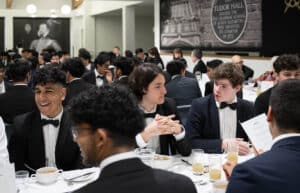 The motion was proposed by the Year 13 pair of Ashwin Sridhar and Sudhamshu Gummadavelly. Opposing it with Saifullah was Mipham Samten (OE 2012–2019). Many Year 13s contributed from the floor.
The motion was proposed by the Year 13 pair of Ashwin Sridhar and Sudhamshu Gummadavelly. Opposing it with Saifullah was Mipham Samten (OE 2012–2019). Many Year 13s contributed from the floor.
Ashwin and Sudhamshu argued that ‘leave’ does not mean ‘forget’, making the case that the past and its injustices should not be allowed to define the future, and that we should move forward with equality of opportunity (rather than imposing discrimination of a different form, such as quotas to seek redress). They cited as a positive example the reconciliation seen in Spain after its civil war and the end of General Franco’s regime, where old differences were left behind.
The opposing OEs defined the key term differently, accusing the boys of wanting to ‘have their cake and eat it’. Those who ignore history are doomed to repeat its errors.
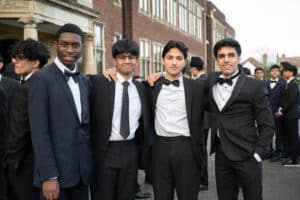 However, at the end of the debate, the proposers’ case had won many over, and the final totals were: 76 for; 55 against; and 39 abstentions. Thus, it was a victory for the School, the Upper Sixth pair successfully convincing people that the past could be left behind, even while its lessons were still being learned.
However, at the end of the debate, the proposers’ case had won many over, and the final totals were: 76 for; 55 against; and 39 abstentions. Thus, it was a victory for the School, the Upper Sixth pair successfully convincing people that the past could be left behind, even while its lessons were still being learned.
In his address, Saifullah, a third-year Law student at Downing College, Cambridge, began thus: “From the celebration of this School’s 450th anniversary, the motion of the upcoming debate and the range of familiar faces on display, the past would appear to have all of us in its embrace tonight.”
He related how he had suffered some early disappointments at Cambridge in moots (mock judicial proceedings set up to examine a hypothetical case as an academic exercise) and was considering stopping doing them altogether, but then scored a memorable success after applying to take part in a Cambridge Union debate. “Given the stakes and the competition, I had no expectations going into the audition. But I also had nothing to lose and, against all the odds, I prevailed. My fellow speakers included a Queen’s Counsel, a Cambridge Professor and most memorably, Lord Neuberger and Lord Sumption, two former justices of the Supreme Court. Debating alongside my childhood heroes whose judgements had helped inspire me to study law was a surreal experience, and one that I will never forget.”
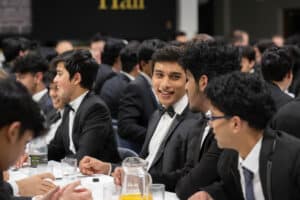 The experience heralded an era of competition success for Saifullah: he has now a record ten mooting and mock trial competitions, and has been a student speaker in six Cambridge Union Debates, the most in recent history.
The experience heralded an era of competition success for Saifullah: he has now a record ten mooting and mock trial competitions, and has been a student speaker in six Cambridge Union Debates, the most in recent history.
He concluded by telling the assembled sixth-formers: “Your time in school will not define your legacy and your purpose as students is not to reap fruit but to sow seeds. You don’t need to be School Captain or valedictorian, and it is often the trees that bloom latest that have the perfect blossom. The road ahead of you is tough, it is treacherous, and it will push you to your limits. But if you walk your path with courage, with conviction and with hope, then you will not only survive but thrive.”

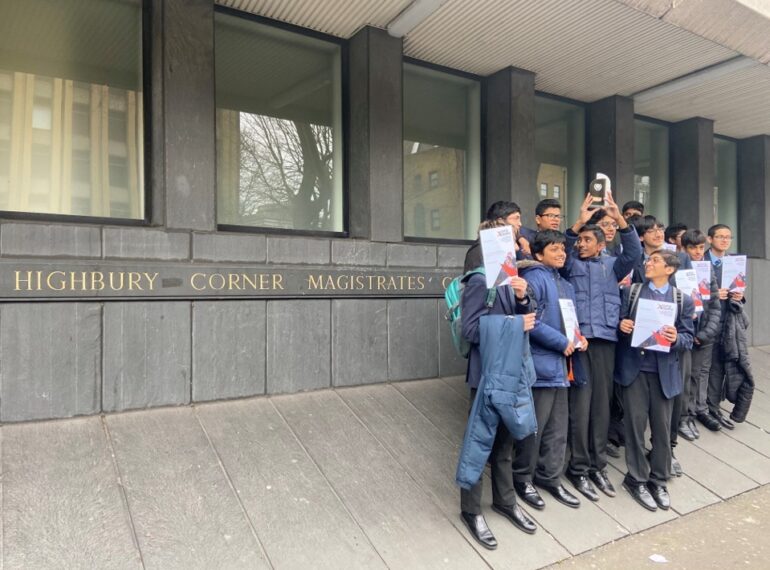
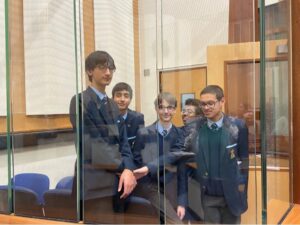 The 14-strong Year 9 team took part in two mock trials in the local heat of the Young Citizens Magistrates’ Court Mock Trial competition.
The 14-strong Year 9 team took part in two mock trials in the local heat of the Young Citizens Magistrates’ Court Mock Trial competition.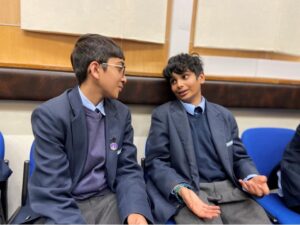 The competition judges were, in fact, real-life magistrates. “We had even had a visit from Magistrate Catherina Daly previously to help us prepare our case,” said Ms Shah. And, adding further to the competition’s verisimilitude, the heat was held at Highbury Corner Magistrates’ Court.
The competition judges were, in fact, real-life magistrates. “We had even had a visit from Magistrate Catherina Daly previously to help us prepare our case,” said Ms Shah. And, adding further to the competition’s verisimilitude, the heat was held at Highbury Corner Magistrates’ Court.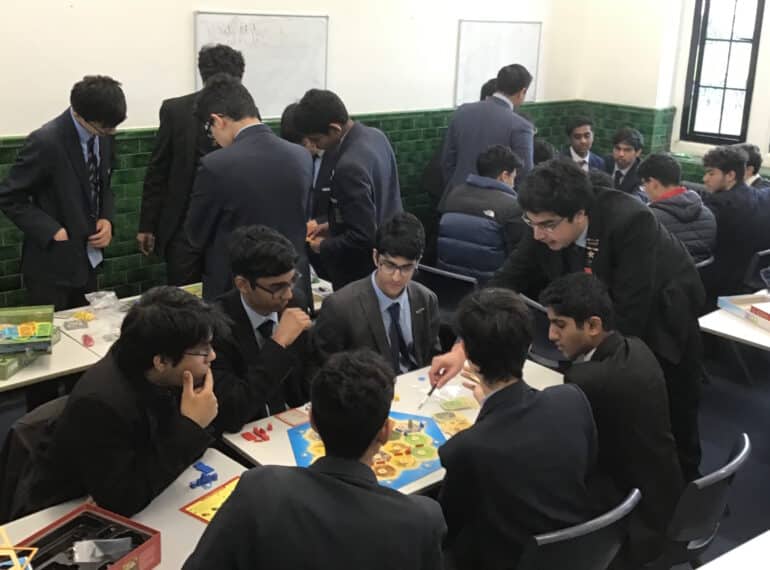
 The festival featured academic tutorials and a lecture from Old Elizabethans, board games, a quiz, a meeting of QE’s Gresham Society for Economics and a special edition of the department’s periodical,
The festival featured academic tutorials and a lecture from Old Elizabethans, board games, a quiz, a meeting of QE’s Gresham Society for Economics and a special edition of the department’s periodical,  Another highlight was a talk by economist and academic Sandeep Mazumder (OE 1993–2000), who is Dean of Hankamer School of Business at Baylor University, Texas.
Another highlight was a talk by economist and academic Sandeep Mazumder (OE 1993–2000), who is Dean of Hankamer School of Business at Baylor University, Texas.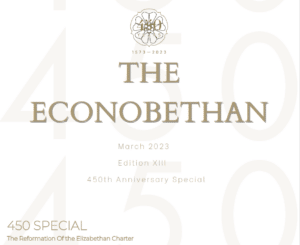 He wrote: “As my predecessor, Dr John Marincowitz (Headmaster 1999-2011), explained at this year’s Senior Awards Ceremony, when discussing his new published history of the School, the fortunes of the School have repeatedly been shaped by the political, economic and social context of the time. He emphasised that much of the interest in the development of Queen Elizabeth’s, and its multiple reinventions over the centuries, can be found in considering not just the ‘what’, but in the ‘how’ and the ‘why’.
He wrote: “As my predecessor, Dr John Marincowitz (Headmaster 1999-2011), explained at this year’s Senior Awards Ceremony, when discussing his new published history of the School, the fortunes of the School have repeatedly been shaped by the political, economic and social context of the time. He emphasised that much of the interest in the development of Queen Elizabeth’s, and its multiple reinventions over the centuries, can be found in considering not just the ‘what’, but in the ‘how’ and the ‘why’.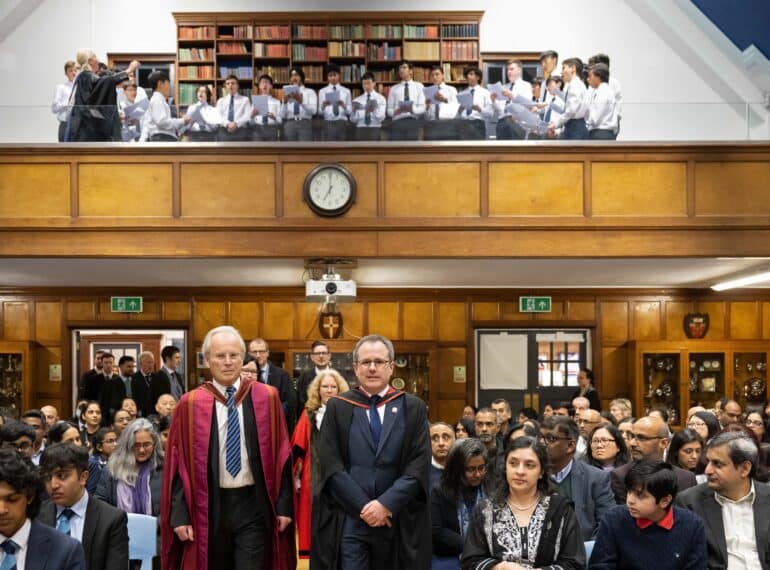
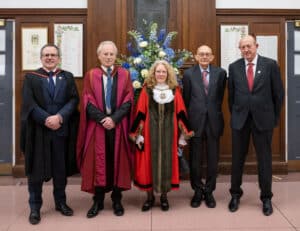 Current Headmaster Neil Enright said it was entirely appropriate that, as QE prepares to celebrate its 450th anniversary tomorrow, the place of honour should go to one of the School’s own. Dr Marincowitz was Mr Enright’s predecessor, holding the role from 1999 until his retirement in 2011.
Current Headmaster Neil Enright said it was entirely appropriate that, as QE prepares to celebrate its 450th anniversary tomorrow, the place of honour should go to one of the School’s own. Dr Marincowitz was Mr Enright’s predecessor, holding the role from 1999 until his retirement in 2011.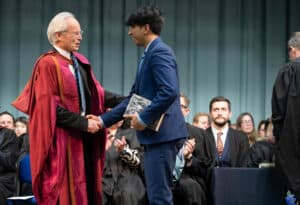 Dr Marincowitz, who first arrived at QE to join the History department in 1985, then presented prizes – which this year included copies of his book – to scores of prizewinners drawn from Years 10, 11 and 12. There were awards for all the academic subjects, for overall academic excellence, for contribution & responsibility and for outstanding performance or contribution in extra-curricular activities such as debating & public speaking, chess, drama and the Combined Cadet Force.
Dr Marincowitz, who first arrived at QE to join the History department in 1985, then presented prizes – which this year included copies of his book – to scores of prizewinners drawn from Years 10, 11 and 12. There were awards for all the academic subjects, for overall academic excellence, for contribution & responsibility and for outstanding performance or contribution in extra-curricular activities such as debating & public speaking, chess, drama and the Combined Cadet Force.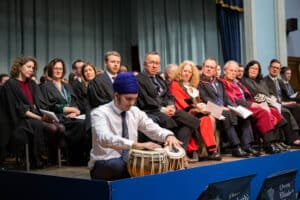 There were the customary musical interludes at the Senior Awards Ceremony, featuring performances by Music prizewinners. The interludes were: 20th-century French composer Paule Maurice’s Tableaux de Provence, performed by Year 10 saxophonist, Leo Sellis; Beethoven’s Romanze, played by violinist Jason Tao, of Year 11, and Rupak Kaida, performed by Year 12 pupil Isher Jagdev, on the tabla.
There were the customary musical interludes at the Senior Awards Ceremony, featuring performances by Music prizewinners. The interludes were: 20th-century French composer Paule Maurice’s Tableaux de Provence, performed by Year 10 saxophonist, Leo Sellis; Beethoven’s Romanze, played by violinist Jason Tao, of Year 11, and Rupak Kaida, performed by Year 12 pupil Isher Jagdev, on the tabla.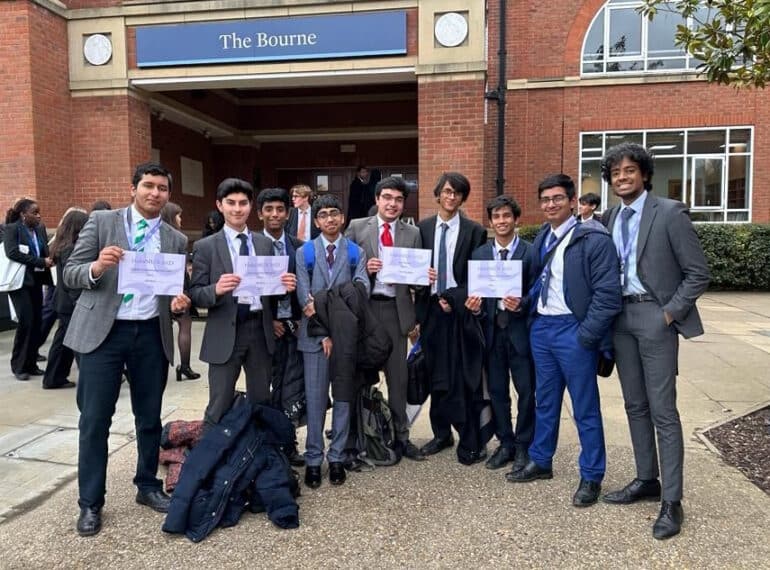
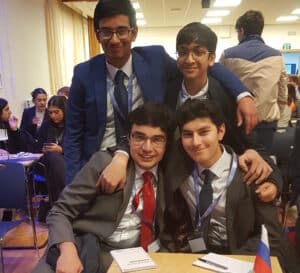 The three-day weekend ‘HabsMUN’ event, hosted by Haberdashers’ Boys’ School, saw a ten-strong QE team take on more than 500 delegates from other leading schools.
The three-day weekend ‘HabsMUN’ event, hosted by Haberdashers’ Boys’ School, saw a ten-strong QE team take on more than 500 delegates from other leading schools.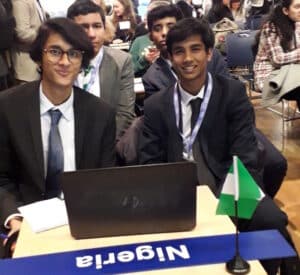 They fended off challenges from several powerful country delegations, including Habs (representing the USA), Royal Masonic School for Girls (UK) and North London Collegiate School (China).
They fended off challenges from several powerful country delegations, including Habs (representing the USA), Royal Masonic School for Girls (UK) and North London Collegiate School (China).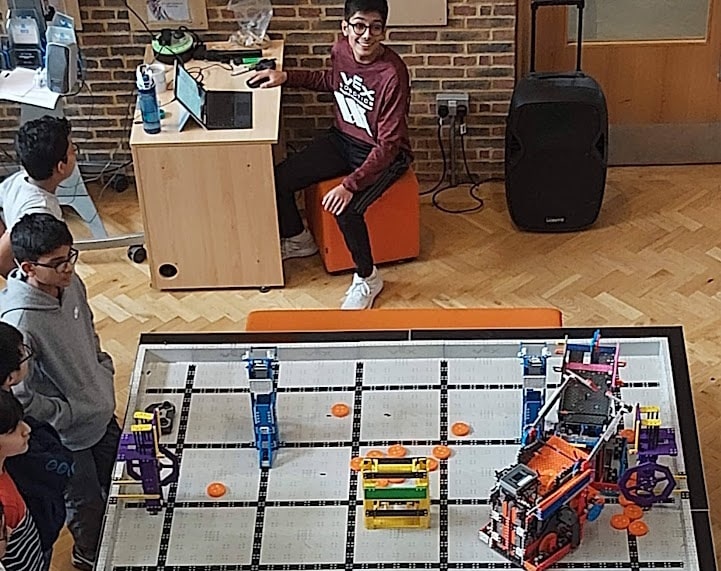
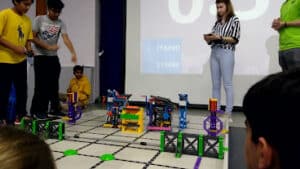 Having already achieved significant successes in recent years at in-person regional, national and international Vex championships – including a world title in 2018 – QE’s robotics teams have recently added online competitions to their repertoire.
Having already achieved significant successes in recent years at in-person regional, national and international Vex championships – including a world title in 2018 – QE’s robotics teams have recently added online competitions to their repertoire.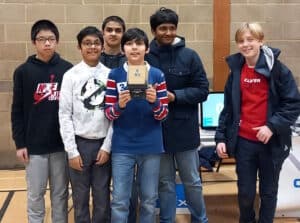 One VRC squad – team number 20785X – was named winner of both the Theme It Up! Challenge and the Community Challenge, as well as being a runner-up in the Career Readiness Challenge. Another, 20785C, took two runner-up spots.
One VRC squad – team number 20785X – was named winner of both the Theme It Up! Challenge and the Community Challenge, as well as being a runner-up in the Career Readiness Challenge. Another, 20785C, took two runner-up spots.